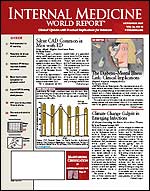Publication
Article
Internal Medicine World Report
Fibrate Therapy Confers Mixed CVD Results in Diabetic Patients
Fibrate Therapy Confers Mixed CVD Results in Diabetic Patients
By Wayne Kuznar
Dallas—Long-term fibrate therapy does not significantly reduce major coronary events in patients with type 2 diabetes, according to the results of the largest study to date to assess the effect of this therapeutic intervention on cardiovascular disease (CV) risk in patients with type 2 diabetes.
Although use of fenofibrate (eg, Tricor, Triglide) in the study known as FIELD (Fenofibrate Intervention and Event Lowering in Diabetes) reduced the risk of nonfatal myocardial infarction (MI), it had no effect on death from coronary heart disease (CHD), announced Anthony Keech, MD, of the University of Sydney, Australia, at the American Heart Association’s Scientific Sessions 2005.
Based on the results from FIELD, a double-blind, randomized, placebo-controlled study (Table), the best use for fenofibrate in the management of patients with type 2 diabetes would likely be in combination with a statin, according to Dr Keech. “This question needs to be considered in future studies,” he said.
FIELD was conducted at 63 centers in Australia, New Zealand, and Finland, with a total of 9795 men and women with type 2 diabetes who had no clear indication for cholesterol-lowering treatment at study entry. Of these, 78% had no history of CV disease (CVD), and 22% had at least 1 manifestation of CVD. Blood glucose was well controlled at baseline, with a median hemoglobin A1c value of 6.9%.
Patients were randomized to treatment with daily micronized fenofibrate, 200 mg, or placebo for an average of 5 years. Statins or other lipid-lowering drugs could be added as needed.
